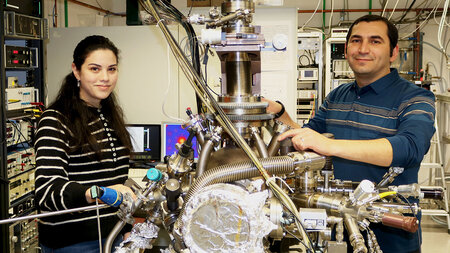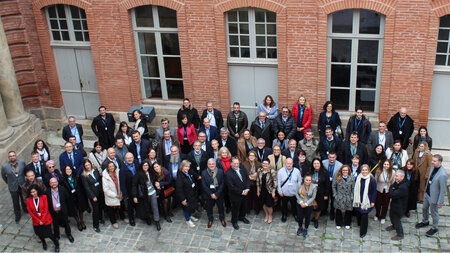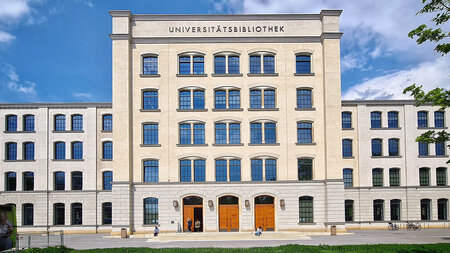Enthusiasm for “epsilons and deltas“
Ten questions for Prof. Dr. Henning Kempka, holder of the Junior Professorship of Analysis since April 2014
-

“I enjoy talking in front of the students and to assist them in understanding processes and, hopefully, to create that “aha experience“, says Junior Professor Dr. Henning Kempka, who wants to give a wide range of knowledge about such core areas of Mathematics as Analysis in his teaching. Photo: Steve Conrad
Jun.-Prof. Dr. Henning Kempka (35) holds the Junior Professorship of Analysis at the Faculty of Mathematics since April 2014. In ten answers he gives the readers of “University News“ an insight into his career, goals and time in Chemnitz.
What do we actually understand under “analysis”?
Analysis is a subsection of Mathematics, which primarily deals with the observation of functions and their properties. In short: This with epsilon and delta.
TU Chemnitz is for me as a professor the right choice, because…
… there is a team of highly experienced and recognized mathematicians, and a place where I was warmly welcomed. Besides, it is possible for me to continue research in my field and to combine with those of my colleagues in Chemnitz.
Could you say a few words about your academic career?
After my studies at the Friedrich Schiller University in Jena, I started there to do a doctorate within the scope of a special research area ”Gravitational Wave Astronomy“ in Physics. After successful doctoral thesis entitled “Generalized 2-microlocal Besov Spaces“, I worked as a postdoc in Jena. In the meantime, I was appointed as a deputy professor at the TU Bergakademie Freiberg.
Describe briefly your study time.
At the beginning of my studies, I enjoyed the many freedoms of the student life with the result that I have almost given up my studies after the second term. The turning point was the intensive study of Analysis in preparation on my first oral exam in Analysis 1&2. It revealed to me the inner logic and structure that is run, on the one hand, through Mathematics and, on the other hand, through each mathematical lecture.
From this point, I began to understand and learn to love Mathematics.
What advice would you give young students and graduates?
If you want, you can achieve many things – also the ones, which seem to be impossible from the first sight. One should be able to work independently and objectively.
What would you like to achieve in the teaching for the future?
Teaching gives me much joy. I enjoy talking in front of the students and, thereby, assist them in understanding processes and, hopefully, to create that “aha experience”. I try to incorporate new ways and methods of teaching in my exercises and seminars. In content, it is close to my heart to give students a broad knowledge of mathematical core areas such as Analysis and, hence, form their abstraction ability. I also like to teach students the beauty and logic of Mathematics and, thus, allow them to participate in the joy of this major. Furthermore, it is my concern to make known the field Fourier Analysis in special lectures of my research field.
Which impact do you make in the research at TU Chemnitz?
The main areas of my research comprise of Harmonic Analysis, particularly in the theory of Function Spaces. Function Spaces are infinitely dimensional vector spaces, where the vectors are functions that fulfill particular integrability and differentiability conditions. Together with Ms. Goncalves, a doctoral student from Portugal, I am working in a project on the properties of Function Spaces with variable exponents, financed by the German Research Foundation. This also has many applications in Physics, for instance, when considering electrorheological fluids. These variable function spaces are also useful in image processing and in financial Mathematics or Stochastics. What is more, I am striving for a strong student exchange (Erasmus) with the universities in Prague and Coimbra.
There are around 45,000 professors at German universities. What sets you apart from others?
It is not my prime concern to have me stand out from other professors, because I also greatly appreciate the work of other scientists. Among my strengths are perseverance and creativity in research, team spirit and good teaching.
Which place do you show your guests the most in Chemnitz?
I am still in the “getting acquainted” phase with the city. I like many small parks, like the one around Schlossteich or the Küchwald. I have come to know and love the rustic art house cinema in Siegmar and there is a very good bakery, not a “bun warmer” near my office.
How do you play a part in the life of the city?
Last year I took part in the corporate challenge race in Chemnitz, I ride a bicycle and come across people with a friendly smile.
Further information about the professorship (only in german) at: https://www.tu-chemnitz.de/mathematik/jun_analysis
(Translation: Nataliia Boiko)
Mario Steinebach
12.03.2015





